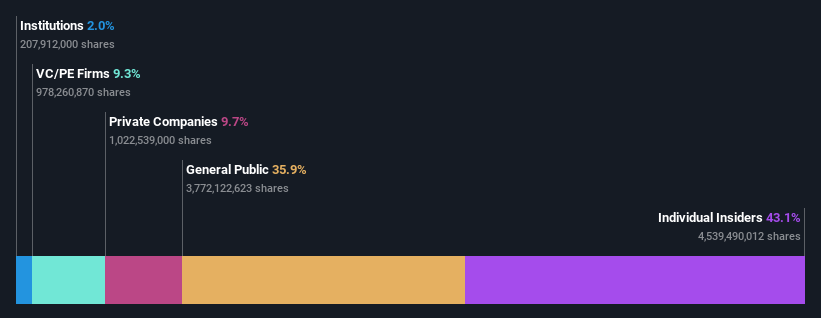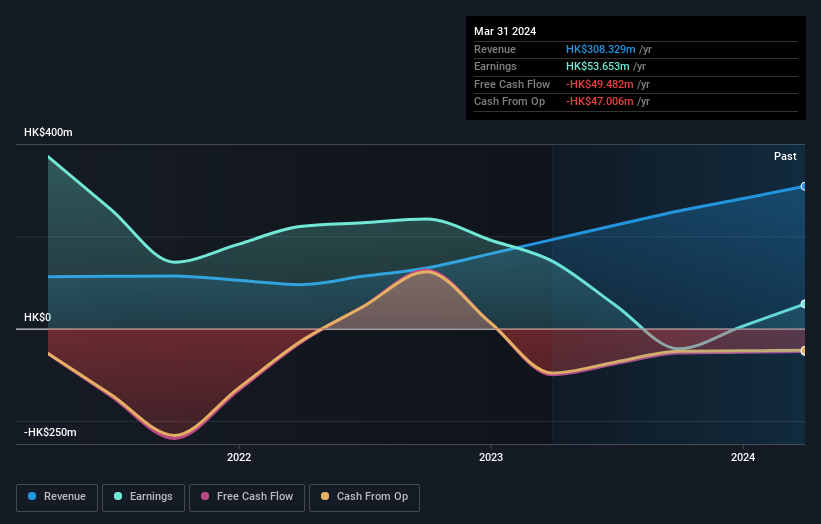Recent 10% decline may not have gone down well with Wealthink AI-Innovation Capital Limited (HKG:1140) insiders who've been purchasing recently
Key Insights
- Significant insider control over Wealthink AI-Innovation Capital implies vested interests in company growth
- A total of 4 investors have a majority stake in the company with 54% ownership
- Recent purchases by insiders
Every investor in Wealthink AI-Innovation Capital Limited (HKG:1140) should be aware of the most powerful shareholder groups. With 43% stake, individual insiders possess the maximum shares in the company. Put another way, the group faces the maximum upside potential (or downside risk).
A quick look at our data suggests that insiders have been buying shares in the company recently. However, with shares price down 10% last week, they must be disappointed.
In the chart below, we zoom in on the different ownership groups of Wealthink AI-Innovation Capital.
See our latest analysis for Wealthink AI-Innovation Capital

What Does The Institutional Ownership Tell Us About Wealthink AI-Innovation Capital?
Institutions typically measure themselves against a benchmark when reporting to their own investors, so they often become more enthusiastic about a stock once it's included in a major index. We would expect most companies to have some institutions on the register, especially if they are growing.
Institutions have a very small stake in Wealthink AI-Innovation Capital. That indicates that the company is on the radar of some funds, but it isn't particularly popular with professional investors at the moment. If the company is growing earnings, that may indicate that it is just beginning to catch the attention of these deep-pocketed investors. We sometimes see a rising share price when a few big institutions want to buy a certain stock at the same time. The history of earnings and revenue, which you can see below, could be helpful in considering if more institutional investors will want the stock. Of course, there are plenty of other factors to consider, too.

We note that hedge funds don't have a meaningful investment in Wealthink AI-Innovation Capital. From our data, we infer that the largest shareholder is Zhiwei Liu (who also holds the title of Senior Key Executive) with 26% of shares outstanding. Its usually considered a good sign when insiders own a significant number of shares in the company, and in this case, we're glad to see a company insider play the role of a key stakeholder. With 9.6% and 9.3% of the shares outstanding respectively, Ming Yang Capital Limited and Tongchuangjiuding Investment Management Group Co., Ltd. are the second and third largest shareholders.
To make our study more interesting, we found that the top 4 shareholders control more than half of the company which implies that this group has considerable sway over the company's decision-making.
While studying institutional ownership for a company can add value to your research, it is also a good practice to research analyst recommendations to get a deeper understand of a stock's expected performance. As far as we can tell there isn't analyst coverage of the company, so it is probably flying under the radar.
Insider Ownership Of Wealthink AI-Innovation Capital
The definition of an insider can differ slightly between different countries, but members of the board of directors always count. Company management run the business, but the CEO will answer to the board, even if he or she is a member of it.
I generally consider insider ownership to be a good thing. However, on some occasions it makes it more difficult for other shareholders to hold the board accountable for decisions.
Our most recent data indicates that insiders own a reasonable proportion of Wealthink AI-Innovation Capital Limited. Insiders own HK$431m worth of shares in the HK$999m company. We would say this shows alignment with shareholders, but it is worth noting that the company is still quite small; some insiders may have founded the business. You can click here to see if those insiders have been buying or selling.
General Public Ownership
With a 36% ownership, the general public, mostly comprising of individual investors, have some degree of sway over Wealthink AI-Innovation Capital. While this size of ownership may not be enough to sway a policy decision in their favour, they can still make a collective impact on company policies.
Private Equity Ownership
With a stake of 9.3%, private equity firms could influence the Wealthink AI-Innovation Capital board. Sometimes we see private equity stick around for the long term, but generally speaking they have a shorter investment horizon and -- as the name suggests -- don't invest in public companies much. After some time they may look to sell and redeploy capital elsewhere.
Private Company Ownership
Our data indicates that Private Companies hold 9.7%, of the company's shares. Private companies may be related parties. Sometimes insiders have an interest in a public company through a holding in a private company, rather than in their own capacity as an individual. While it's hard to draw any broad stroke conclusions, it is worth noting as an area for further research.
Next Steps:
While it is well worth considering the different groups that own a company, there are other factors that are even more important. For example, we've discovered 1 warning sign for Wealthink AI-Innovation Capital that you should be aware of before investing here.
Of course this may not be the best stock to buy. So take a peek at this free free list of interesting companies.
NB: Figures in this article are calculated using data from the last twelve months, which refer to the 12-month period ending on the last date of the month the financial statement is dated. This may not be consistent with full year annual report figures.
Have feedback on this article? Concerned about the content? Get in touch with us directly. Alternatively, email editorial-team (at) simplywallst.com.
This article by Simply Wall St is general in nature. We provide commentary based on historical data and analyst forecasts only using an unbiased methodology and our articles are not intended to be financial advice. It does not constitute a recommendation to buy or sell any stock, and does not take account of your objectives, or your financial situation. We aim to bring you long-term focused analysis driven by fundamental data. Note that our analysis may not factor in the latest price-sensitive company announcements or qualitative material. Simply Wall St has no position in any stocks mentioned.
 Index Options
Index Options CME Group
CME Group Nasdaq
Nasdaq Cboe
Cboe TradingView
TradingView Wall Street Journal
Wall Street Journal